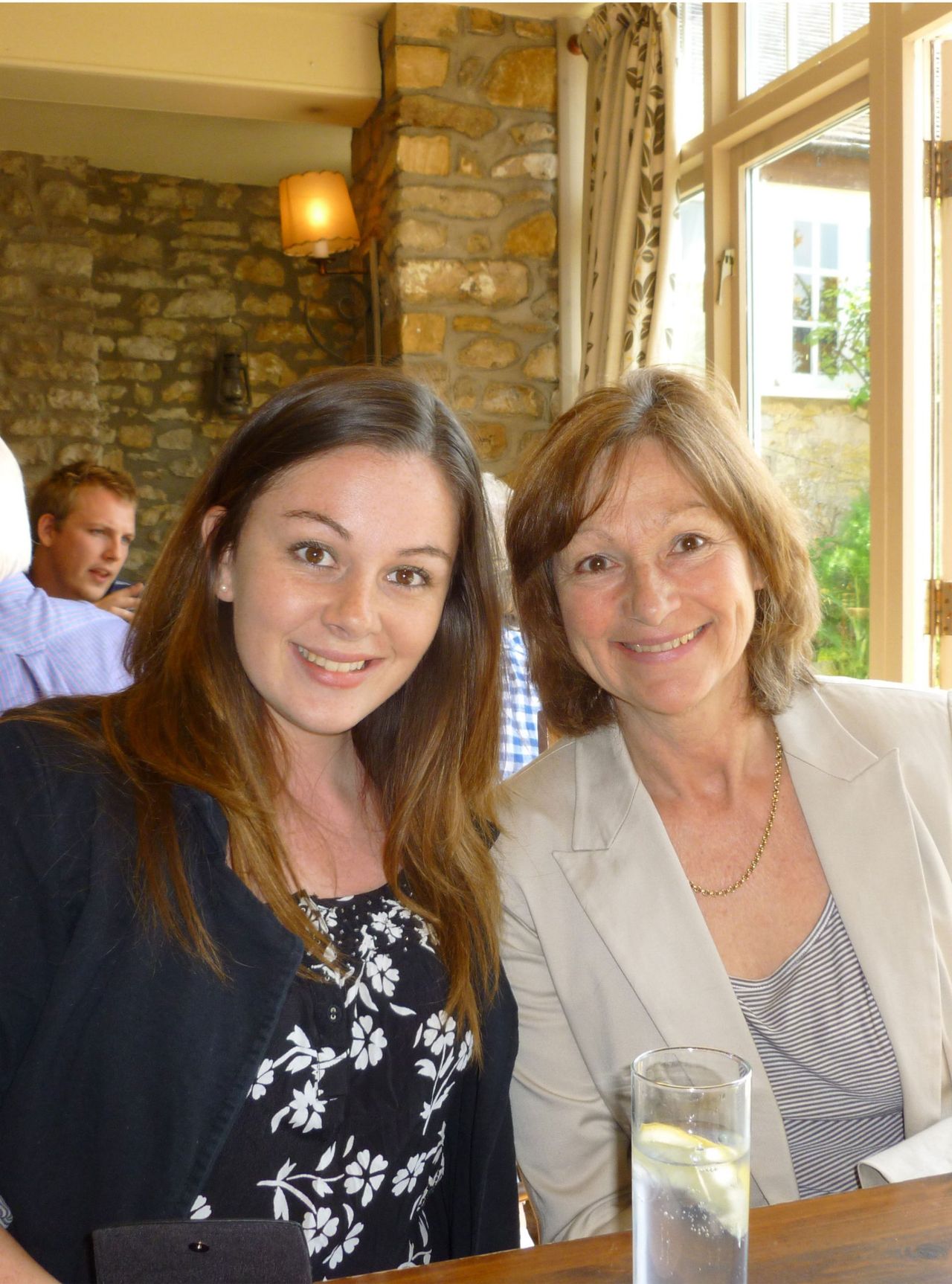"A Tick Bite Lost Me 11 Years Of My Life"

Lyme disease is on the increase in Britain. Yet diagnosis can be difficult - as can the right treatment. Maxine Frith speaks to one sufferer and her mother about how the debilitating illness has radically changed both of their lives...
Natasha Metcalf, 31, lives in Gloucestershire with her parents. She first started getting symptoms for Lyme disease when she was 16 - but it took until 2011 for her to be finally diagnosed.
"I was 16, had just started boarding school in Wiltshire and was really happy. I'd been living in Hong Kong with my parents and younger brother - my dad was working there as an airline pilot. I loved my new school, had made lots of friends and was getting good grades. After the first term I went home for Christmas. But in the second term everything fell apart. Looking back, I think I may have been bitten by a tick during the holidays in Hong Kong, but other people have been infected in England, especially in forest areas, so I'll never know.
I began to get splitting headaches, which I'd never had before. It felt like a switch had gone off in my brain - I couldn't concentrate in lessons or read even a page of a book. Then I started getting awful night sweats. I was sharing a room with another girl and it was really embarrassing as my sheets would be dripping wet each morning.
I became withdrawn and anxious. I'd gone from being this girl who was really enjoying life to someone who wouldn't leave their room. When I tried to talk to the school about it they said I must be homesick - but I just felt really ill and tired.
About a month later my mum came to see me, and she was so worried that she said I had to come home immediately. I'd lost a lot of weight and looked awful. When we got back to Hong Kong, I went to bed for three months because I simply had no energy.
The doctors I visited were convinced the problem was psychiatric - they kept saying I was depressed and anxious. I didn't feel that way but because I was young, I felt they must know better. I managed to get through A-levels at my old school in Hong Kong, then started an English Literature degree at Exeter University. Having a lot of rest had allowed my body to recover a bit, but also with Lyme, I now know, your body can recover and then the parasite attacks you again
Sign up for the woman&home newsletter
Sign up to our free daily email for the latest royal and entertainment news, interesting opinion, expert advice on styling and beauty trends, and no-nonsense guides to the health and wellness questions you want answered.
The first term was brilliant - I loved student life, made friends, then suddenly out of the blue, the same thing happened. I got terrible headaches, became forgetful, had flu-like symptoms and joint pain, and found it hard to swallow. The university medical practice said it was just student life, anxiety, depression, but I couldn't go on and had to leave.
Over the next few years, the same thing happened. I would go home, feel a bit better, go back to university and then feel terrible again. The university was great - they kept my place open, and by 2008 I was in my final year, with a job in recruitment lined up in London.
My friends and I were organising a trip to Africa and we had to get some vaccinations. Everyone else was fine but literally overnight I went down like a ton of bricks. It was like my whole immune system collapsed. I gave up the job in London and went back to Hong Kong to do the rounds of doctors again. Over that time I saw 40 different practitioners and at one point I was on seven different psychiatric drugs. I saw countless doctors in both England and Hong Kong but no one even considered Lyme disease - they were all fixated on the idea it was depression or chronic fatigue syndrome.
I was desperate to get better, and even though I didn't think I was depressed, I went 100 per cent for the things the doctors recommended - cognitive behavioural therapy, graded physical exercise, anti-depressants and ‘Beating the Blues' leaflets. Nothing worked.
Then the seizures started. I was on the sofa one day, watching TV, and I just started shaking uncontrollably and then convulsed. My parents took me to A&E - the doctors there said it was a panic attack. My friends were all starting jobs, getting promoted and travelling and I was unable to get out of bed. I was so weak my parents had to help me walk up the stairs - but the doctors were still telling me it was all in my head.
Finally, in 2011, a friend of my parents suggested I should see a doctor he knew in California who specialised in complex cases such as mine and had a reputation for thinking outside the box. At this stage I would have done anything. I remember saying to my mum: ‘This will kill me.' I honestly felt like that.
Mum and I travelled to the US, and within ten minutes of seeing this doctor he said ‘I think you have Lyme disease.' It was a very emotional moment for me. It was the first time I felt a doctor had believed me. It wasn't in my head and I wasn't going mad. I thought, great, now I can be treated.
But that just propelled me into another quagmire. My family was living back in the UK by then and the doctors just wouldn't believe the diagnosis. My GP said he didn't believe the US test but he wouldn't do the test for Lyme disease because he thought I had chronic fatigue syndrome - ME. We had to order all the antibiotics and other nutritional supplements from the US. Even now, my GP still doesn't really help me at all - we have had to go privately for everything. The NHS is only just beginning to realise that this is a real problem.
I'm lucky because my parents have been amazing. My mum has spent months in the US with me; she's had to administer treatments for me, support me. Mum and Dad have spent their retirement fund on helping me get better.
From the moment I started on the Lyme treatment I got better. The seizures stopped, my pain lessened, I had more energy. My health has improved - but because it took so long for me to be diagnosed I still have serious problems. My vision is affected. I used to love going to bars and restaurants but I can't cope with loud places. My heart health is affected. I still have a lot of pain, dizziness and fatigue. I have good days and bad days. My friends are now getting on the property ladder, getting promoted, getting married. In contrast, I am single, living with my parents and I can't work.
I am in remission but I'm not cured. Lyme can hide in your body for years and mask itself as other stuff. There is controversy about how Lyme is transmitted and I'm worried about whether I could pass it on to a child if I do meet someone and want to start a family. I feel I've lost my teens and twenties to this disease. I don't want to lose my thirties to it, too." Michela is 63 and a retired language teacher. As well as Natasha she has a son James, 29, who is an airline pilot.
"Natasha was a very bright child - bubbly, always laughing, running about and writing and reading. She had lots of friends. We are a very close family but she loved being at boarding school, too.
And then suddenly, that all seemed to go. I was so worried that I flew from Hong Kong to see her. From the moment I walked in and saw her I was shocked. She had lost so much weight, she looked so ill, that I just scooped her up and took her home.
From the very beginning, none of the doctors' diagnoses made sense. I knew her body was under attack. I know my daughter but the doctors kept saying it was psychological. I couldn't believe that. She just kept deteriorating. The hardest thing was watching it week by week, day by day. Also, as a mother you begin to feel guilty because the implication was that it was our fault as parents.
But from the very beginning I believed what Natasha was telling me about how she felt. When the seizures started, I realised we needed to do something. We honestly felt that she might die but no one was taking us seriously.
Getting a diagnosis was wonderful - but it was the beginning of another battle, and my husband has had to carry on working very hard to pay the medical bills.
Our lives today aren't what we thought they would be. I feel so sad for Natasha that she is living with us when her friends are moving on. Even crossing the road or going to a cafe for coffee is a major thing for her because she gets dizzy, fatigued and ill.
Still, Natasha amazes me - she is so positive; she's set up a support forum for Lyme sufferers and is determined to make the best of her life. I feel very angry and bitter that it took so long for her to be diagnosed but I am very proud of how she has dealt with this."
What is Lyme disease?
- According to the NHS, around 3,000 people a year are diagnosed with Lyme disease in Britain each year, though the charity Lyme Disease Action believes the true figure who have the illness could be as high as 15,000 since a lack of awareness among the public - and doctors - means many more may have the disease but do not know it.
- Lyme disease is spread by ticks, and symptoms can include chronic fatigue, headaches and joint pain. Ticks are found where there is long grass or woodland, and are more prevalent between April and October. Experts believe the rise in the disease is partly due to warmer winters, which prolong the lives of ticks. Areas with a particularly high population of ticks include Exmoor, the New Forest, parts of Surrey and West Sussex, the Lake District and the Scottish Highlands.
- Caught early, Lyme disease can be treated with antibiotics - but if left untreated (and there is currently no clear medical consensus on the treatment of post-infectious Lyme disease) then the long-term damage to health can be devastating - for instance, meningitis, facial paralysis and heart failure.
- Awareness has increased recently since the Phones 4u founder John Caudwell announced that his 20-year-old son, Rufus, has been diagnosed with the disease following nine years of what were initially thought to be mental health issues. Other high-profile sufferers include the American singer Avril Lavigne.
- There is currently no vaccination. The NHS advises the best way to prevent the illness is to cover up when visiting areas where ticks are likely to be found, use insect repellent and stick to footpaths. If you discover a tick on your skin, remove it immediately. People are more likely to become infected if the tick remains attached to their skin for more than 24 hours. For more information, visit lymedisease.action.org.uk; the support forum Natasha has set up is called lymediseaseuk.com
Natalia Lubomirski is a health journalist with 16 years' experience in the publishing industry. She has worked for a number of well-known magazines and websites including Marie Claire, marieclaire.co.uk, woman&home, Top Sante, Boots and The Telegraph.
She likes to think she practices what she preaches when it comes to health and fitness. She loves the great outdoors and you’ll often find her up a mountain somewhere. She’s climbed eight major mountain ranges across four continents and hit the summit of Half Dome (in Yosemite) during her honeymoon.
-
 The White Company's Hypoallergenic Mattress Topper is surprisingly affordable and a dream to sleep on
The White Company's Hypoallergenic Mattress Topper is surprisingly affordable and a dream to sleep onThe The White Company Hypoallergenic Comfort Topper offers a gentle, supportive layer to your sleep set-up for a surprisingly affordable price.
By Laura Honey Published
-
 Gwyneth Paltrow’s classic pinstripe pyjamas will keep you cool and comfortable on warm nights
Gwyneth Paltrow’s classic pinstripe pyjamas will keep you cool and comfortable on warm nightsChic and comfortable? Her stylish pyjama set is our new go-to
By Charlie Elizabeth Culverhouse Published